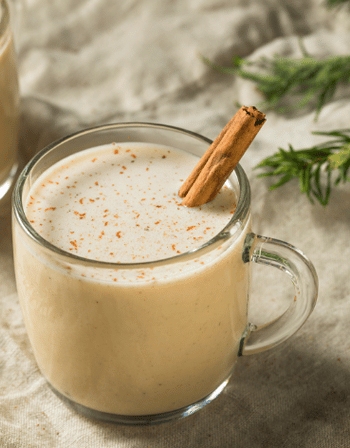Eggnog is a popular holiday beverage that is enjoyed in many countries around the world. But where did eggnog originate and who invented it?
Eggnog was invented by the British medieval upper class. In the Middle Ages, eggnog was a drink of choice for the upper classes. It was made with eggs, cream, and alcohol, and was served during holiday celebrations.
In this article, I will explore the history of eggnog and how it has evolved over time. From its origins in medieval Europe to its modern-day popularity, eggnog has a long and storied history. So if you’re a fan of this festive drink, keep reading to learn more!
What Is Eggnog?

Eggnog is a sweet, creamy drink that is traditionally served during the holiday season.
It is made with milk, cream, sugar, and beaten eggs, and it is often flavored with spices such as nutmeg, cinnamon, and vanilla.
Eggnog can be served chilled or hot, and it is often served in a festive glass or mug.
There are many variations of eggnog, including non-alcoholic versions made with eggnog-flavored syrup and dairy-free versions made with coconut milk or almond milk.
Some people also add alcohol, such as rum, brandy, or whiskey, to their eggnog for an extra kick.
Eggnog is enjoyed by people of all ages and is a beloved holiday tradition in many countries around the world.
Whether served at a holiday party or enjoyed as a cozy treat at home, eggnog is a delicious and festive way to celebrate the holiday season.
Where Did Eggnog Come From (Which Country)?
Eggnog is a creamy, boozy holiday drink that’s been around since medieval times.
It was originally just called a “Christmas drink,” and it served as an aid to digestion (which was important before they had antacids and such).
So, where did eggnog originate? Eggnog is a drink that originated in medieval Britain. It was made from ale, eggs, sugar, and nutmeg.
In the 18th century, eggnog was also made with rum, brandy, or whiskey.
In medieval times, when most people couldn’t afford eggs, eggnog was made with whole eggs that were beaten into a froth and then mixed with milk and sugar.
The name of the drink comes from the custard-like texture of the drink.
The word “nog” comes from noggin, which is an old English word for a small wooden cup.
Nog was a strong alcoholic drink that was popular in this period. This original eggnog recipe did not have milk or cream, but it did have alcohol.
Over time, eggnog changed to include milk and cream.
In the 18th century, it began to be served as more of a Christmas drink, as well as being used as a hangover cure.
Who Invented Eggnog?
It is difficult to say exactly who invented eggnog, as the origins of this holiday drink are somewhat unclear.
Eggnog is believed to have evolved from a variety of older alcoholic punches and milk-based drinks that were popular among the medieval British upper class.
One of the oldest known ancestors of eggnog is a drink called posset, which was popular among the medieval British upper class.
Posset was a hot milk dish that was curdled with wine or ale and honey-sweetened.
It was frequently offered as a medical beverage to treat colds and other illnesses.
Where Was Eggnog Invented?
Many people are uncertain about where was eggnog invented.
The answer is the British Isles, where it was frequently served during holiday gatherings and other festive events, eggnog rose to prominence.
Its history dates back to the 13th century when it was a drink that soldiers would drink before going into battle.
It was made with eggs, sugar, cream, and ale. The soldiers believed that drinking eggnog would give them the strength of an ox.
The first recorded mention of eggnog appeared in 1764 when it was described as having been served at a party hosted by the Duke of Norfolk.
But it seems that this particular type of eggnog was not yet popular enough to be available to the general public, as no further mention of it was made until 1837.
How to make traditional eggnog?
If you’re wondering how to make traditional eggnog at home, here is a recipe that you can follow:
Ingredients (for 8 servings):
- 6 egg yolks
- 1/2 cup sugar
- 1 pint heavy cream
- 1 pint whole milk
- 1/4 cup brandy, rum, or whiskey (optional)
- 1 teaspoon vanilla extract
- Ground nutmeg, for garnish
Instructions:
- In a large bowl, beat the egg yolks until they are light and fluffy. Gradually add the sugar, beating until the mixture is well combined.
- In a separate bowl, whisk together the heavy cream and milk. Slowly add the cream and milk to the egg yolk mixture, stirring constantly to combine.
- If you are using alcohol, add it to the mixture and stir to combine.
- Transfer the mixture to a large pitcher or container, and stir in the vanilla extract. Cover and refrigerate the eggnog until it is chilled, at least 2 hours or overnight.
- When you are ready to serve the eggnog, pour it into glasses and sprinkle a little bit of ground nutmeg on top of each serving.
What Is the History of Eggnog?

The history of eggnog is a rich and varied one, with roots stretching back to medieval Europe and the holiday traditions of the British Isles.
Here are some key points to consider when writing about the history of eggnog:
- The phrases “egg” and “nog,” which were terms used to describe a type of strong beer or ale that was popular in England during the 17th and 18th centuries, are said to have been combined to create the name “eggnog.”
- Eggnog has its roots in a variety of older alcoholic punches and milk-based drinks that were popular in Europe during the Middle Ages and Renaissance.
- Some historians believe that eggnog may have been inspired by a drink called posset, which was made from hot milk curdled with wine or ale and sweetened with honey. Others believe that eggnog was influenced by a drink called syllabub, which was made from milk, cream, and wine or spirits.
- Eggnog became popular in the United States in the 18th and 19th centuries, where it was often served at holiday parties and other festive occasions. It has since become a beloved holiday tradition for many people around the world, and it is often served at Christmas and other winter celebrations.
- Today, eggnog is enjoyed by people of all ages and is available in a variety of flavors and styles, from traditional homemade recipes to commercial versions that are sold in stores. It is also often used as a base for other holiday drinks, such as eggnog latte or eggnog martini.
FAQ
Now I’ll present to you some of the frequently asked questions about where did eggnog originate.
Why Is it Called Eggnog?
The name “eggnog” is believed to be a combination of the words “egg” and “nog,” which was a term used to describe a type of strong beer or ale that was popular in England during the 17th and 18th centuries.
Why is eggnog a Christmas drink?
It is often associated with Christmas and other winter holidays and is typically served during the holiday season.
What do they call eggnog in France?
In France, the drink that is similar to eggnog is called “lait de poule,” which means “hen’s milk” in French
Is eggnog anti-inflammatory?
Even though it has some benefits, it is generally not advisable to consume eggnog and other food with large amounts of high-calorie, high-fat, or high-sugar foods, including eggnog, as part of a healthy, anti-inflammatory diet.
Can you freeze eggnog?
Yes, it is possible to freeze eggnog. To freeze eggnog, pour it into an airtight container and place it in the freezer.
Conclusion
In conclusion, eggnog is a beloved holiday beverage that has a long and storied history.
While the exact origins of eggnog are somewhat disputed, it is believed to have originated in medieval Europe, where it was known as “posset.”
I hope you have enjoyed learning about the history of eggnog and its evolution over time.
If you have any additional thoughts or comments about where did eggnog originate, I would love to hear from you in the comments section below.
If you enjoy reading this article, I suggest you check out the invention of Horchata, or maybe honey mustard.
So why not leave a comment and share your thoughts on these delicious and festive holiday drinks?

